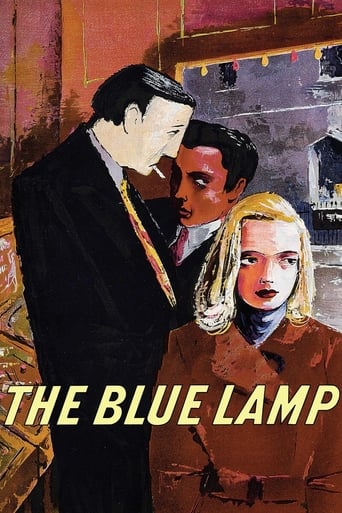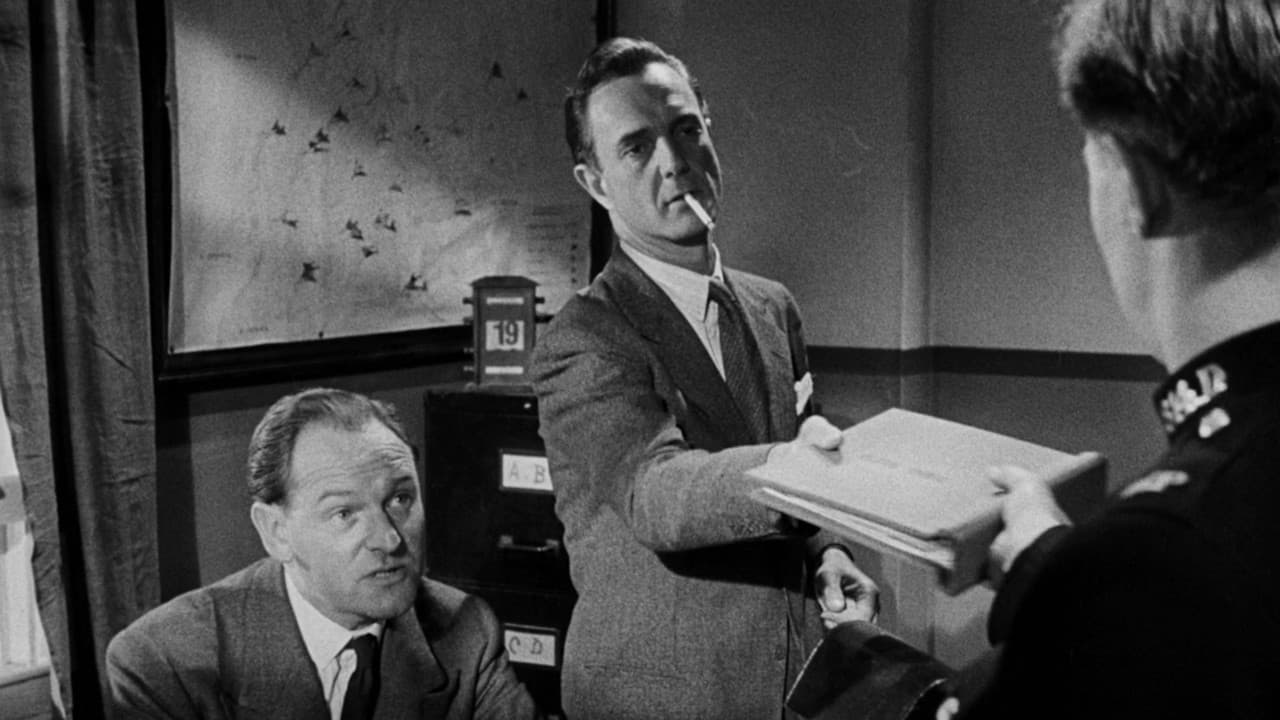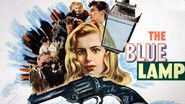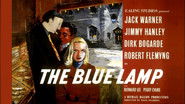pesda
An excellent film for its time, but would barely make for an episode of the "Bill" these days.Officers do still have a relationship with the local underworld, that's one thing that computerisation has failed to eradicate, incredibly its still possible to Police by instinct - even these days.The other similarity is that a largely unarmed Force is still out there confronting criminals who are sometimes armed and young Officers do pay the ultimate price for their bravery - remember that.Maybe the new Ealing should make for a 21st Century re-make (Like they have with St Trinian's). A Police drama from the ordinary copper's point of view that would make a change ! Anybody in "The Job" knows that the majority of the TV Dramas bear little relation to the real world however gritty the script or artistically they are filmed. Come on Ealing I dare you.
Jackson Booth-Millard
I can't remember which part of the film has someone saying what "The Blue Lamp" means, but I stuck with this quite good film, and I was thinking of switching off. Basically Jack Warner as PC George Dixon and Jimmy Hanley as PC Andy Mitchell are on the lookout for two criminals who have murdered an officer, and stolen a couple of things. That is pretty much all I can think of to say about the film, because that is all I remember. I think one main reason I wanted to see this film was because of James Bond's Bernard Lee as Insp. Cherry, he wasn't on often though. Also starring Dirk Bogarde as Tom Riley, Robert Flemyng as Sgt. Roberts, Peggy Evans as Diana Lewis, Patric Doonan as Spud, Bruce Seton as PC Campbell and Meredith Edwards as PC Hughes. Considered to many as a classic, for me, only worth seeing once. It won the BAFTA for Best British Film. Okay!
ianlouisiana
"The Blue Lamp" is a Cockney Epic.Like"Dance Hall"and"It always rains on Sundays"films that drew on London working-class life for their inspiration and the working-class for their audience. Although Ealing is best remembered for its comedies it was perfectly capable of making "issue" pictures,and in "The Blue Lamp" the issue was the increase of violent crime since the second world war which had ended five years previously. It is probable that the catalyst was the De Antiquis murder in 1948 when a gang robbing a Soho jeweller shot a motor-cyclist who tried to intervene. (In the opening sequence a shot of a newspaper reporting this killing is prominent). Firearms brought home as souvenirs by returning servicemen found their way into the hands of petty criminals many of whom had been taught to kill by the government and could not see any difference between killing the enemy and killing a bank clerk. Despite a vigorously pursued policy of corporal and capital punishment,crime rose to what was then an all-time high. It is against this background that "The Blue Lamp" must be considered.It was one of the last films to show "posh"policemen. The characters played by Anthony Steele and William Mervyn are clearly upper middle class,Mervyn's Chief Inspector probably a relic from the discredited Trenchard Scheme whereby the Metropolitan Police recruited it's own officer class in short-sighted (and short-lived)admiration for the military. George Dixon has been at Paddington for 25 years and is on the brink of retirement.His local knowledge is unrivalled,his position in society and his right to exercise power unquestioned.This type of officer and his brand of policing has been consigned to history. Rather like a Western set at the dawn of the 20th century,"The Blue Lamp"in hindsight appears as a picture of a way of life about to be overtaken by progress.It is a world of bombsites,spivs,milk bars and barrow boys.A trolleybus trundles along streets sparse with traffic. Tessie O'Shea is entertaining a music hall audience many of whom could probably remember Marie Lloyd appearing in the same theatre.The new age is represented by ruthless thug Mr Dirk Bogarde.Cunning and cruel,he is nobody's mug.In a scene that still has the power to disturb he shoots Pc Dixon in cold blood at the scene of a robbery.When he suspects his girl friend is about to turn him in he strangles her. The rest of the film is concerned with the police hunt for the killer who will surely hang for his crimes.It is hopelessly old-fashioned in it's unquestioning support for the police.Nobody is counselled,no community representatives are consulted by senior officers leading the hunt and Mr Bogarde's human rights are clearly abused when 2 or 3 rather angry policemen cart him off at the end. Nonetheless "The Blue Lamp" is essential viewing for anybody interested in the development of what might be called English film noir. Many of the exteriors seem to presage the cinema verite movement and it was very influential in the development of the TV cop show from "Dixon of Dock Green" through to "Z Cars" and ultimately "The Bill" although I doubt that George Dixon would recognise the latter as being about the same job unless he had been smoking something very naughty in that pipe of his. Mr Jack Warner plays George Dixon as the archetypal London bobby,a figure who may have never actually existed but who we have felt compelled to invent to invoke a more innocent age when a clip round the ear was rather more effective than an ASBO. Policemen have never been angels,but at least in 1950 they were portrayed as decent ordinary men not violent psychopaths.In those days the villains were the bad guys.Moral equivalence,the "No Blame "culture and all the "isms" that are stunting our society were not even a gleam in a Social Worker's eye.
James Byrne
THE BLUE LAMP, voted Best Film of the Year in 1950 by the British Film Academy, is a semi-documentary homage to the post-war Bobby on the beat. PC Dixon shows a young rookie, Andy Mitchell, the ropes and offers him lodgings under his own roof. Two young hoodlums rob a cinema, and one of them, Tom Riley, shoots Dixon, who later dies in hospital. After his accomplice Spud is killed in a car crash, Riley is finally apprehended in the White City Stadium; the police are helped by the criminal underworld, and the bookies using their tic-tac code. THE BLUE LAMP is famous for two reasons, it made a star of Dirk Bogarde, and introduced Jack Warner to the character of PC George Dixon, who later appeared in 430 episodes, (1955-1976) in the BBC favourite "Dixon of Dock Green". The location shots are a breath of fresh air, real policemen were drafted in to control the crowds during the shooting of these scenes. The cast are excellent, particularly Bogarde and Warner, with three exceptions. Peggy Evans goes way over the top as Diana Lewis, the hysterical moll of Bogarde. She screams, and screams and screams her lines. The young couple who witness Dixon's shooting at the cinema, and disagree with each other on every subject, are just plain ridiculous. If only Bogarde had shot them instead of good old Jack Warner. Also, the little girl, Queenie, who finds the discarded revolver, and answers 'no' to every single question of Jimmy Hanley, is quite obviously not a child prodigy. It was great to see Sam Kydd pop up at the exciting White City climax as the bookies assistant. Basil Radford appeared in the movie by accident. Scenes were being filmed in a billiard hall near Piccadilly Circus when Basil went in looking for a game, and ended up in a scene with a background group of extras. THE BLUE LAMP is always a pure joy to watch, and is justifiably regarded as a post-war classic of British cinema.


 AD
AD





